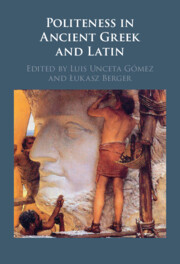Book contents
- Politeness in Ancient Greek and Latin
- Politeness in Ancient Greek and Latin
- Copyright page
- Contents
- Figures and Tables
- Contributors
- Preface
- Abbreviations
- Part I Introduction
- Part II The Expression of Im/Politeness
- Chapter 2 Towards a Comparison of Greek and Roman Politeness Systems
- Chapter 3 How to Be Polite without Saying ‘Please’ in Classical Greek?
- Chapter 4 Text as Interaction
- Chapter 5 Politeness Formulae in Roman Non-Literary Sources
- Part III Im/Politeness in Use
- Part IV Ancient Perceptions on Im/Politeness
- Glossary
- References
- Index Rerum
- Index Locorum
Chapter 4 - Text as Interaction
Vt Mihi (Quidem) Videtur as a Hedging Device in Latin Literary Texts
from Part II - The Expression of Im/Politeness
Published online by Cambridge University Press: 08 September 2022
- Politeness in Ancient Greek and Latin
- Politeness in Ancient Greek and Latin
- Copyright page
- Contents
- Figures and Tables
- Contributors
- Preface
- Abbreviations
- Part I Introduction
- Part II The Expression of Im/Politeness
- Chapter 2 Towards a Comparison of Greek and Roman Politeness Systems
- Chapter 3 How to Be Polite without Saying ‘Please’ in Classical Greek?
- Chapter 4 Text as Interaction
- Chapter 5 Politeness Formulae in Roman Non-Literary Sources
- Part III Im/Politeness in Use
- Part IV Ancient Perceptions on Im/Politeness
- Glossary
- References
- Index Rerum
- Index Locorum
Summary
The chapter focuses on the pragmatic valence of the parenthetical clause ut mihi (quidem) uidetur, a formulation which, by underscoring the subjective value of a statement, often conveys important interactional functions. A close survey of the use of this expression in Latin authors from Cicero to Augustinus highlights the essentially redressive value of the formula, which mainly acts as a mitigating hedge in stance taking, aimed at avoiding the negative effects of potential face-threatening acts and at managing self-presentation. Special attention is paid to Cicero’s usage of the formula as a refined conversational marker, through which the speaker showing modesty and awareness of others’ value reveals his superior moral and social standing. Hence, the chapter explores the role of speaker-oriented strategies of politeness in Rome, as part of an interactional style aimed at indexing a precise social identity.
Keywords
- Type
- Chapter
- Information
- Politeness in Ancient Greek and Latin , pp. 103 - 126Publisher: Cambridge University PressPrint publication year: 2022

